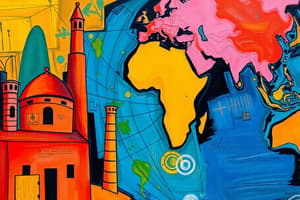Podcast
Questions and Answers
Which event marked the significant transition in Europe following the fall of the Roman Empire?
Which event marked the significant transition in Europe following the fall of the Roman Empire?
- The spread of the Black Death
- The rise of feudalism (correct)
- The emergence of the Renaissance
- The establishment of the Catholic Church
What were key features of early civilizations?
What were key features of early civilizations?
- Complex social structures and specialized labor (correct)
- Nomadic lifestyles and tribal leadership
- Simple architecture and decentralized governance
- Religious uniformity and lack of trade
Which movement directly challenged the authority of the Catholic Church during the Early Modern period?
Which movement directly challenged the authority of the Catholic Church during the Early Modern period?
- The Enlightenment
- The Scientific Revolution
- The Renaissance
- The Protestant Reformation (correct)
What impact did the Industrial Revolution have on society?
What impact did the Industrial Revolution have on society?
Which of the following was NOT a characteristic of Medieval Society?
Which of the following was NOT a characteristic of Medieval Society?
What role did interactions between civilizations primarily involve?
What role did interactions between civilizations primarily involve?
What was a significant outcome of the Cold War?
What was a significant outcome of the Cold War?
What characterized the Renaissance period?
What characterized the Renaissance period?
Which of the following best describes nationalism in the modern era?
Which of the following best describes nationalism in the modern era?
Which architectural style became prominent during the Medieval period?
Which architectural style became prominent during the Medieval period?
Flashcards
Agriculture and Civilization
Agriculture and Civilization
The development of farming allowed people to settle in one place, leading to the creation of towns and cities.
Social Structures
Social Structures
Early civilizations had complex systems of social organization with different groups having different roles.
Specialized Labor
Specialized Labor
Specialized labor, like farming, crafting, or building, allowed civilizations to become more efficient and develop specific skills.
Monumental Architecture
Monumental Architecture
Signup and view all the flashcards
Early Writing Systems
Early Writing Systems
Signup and view all the flashcards
Interactions between Civilizations
Interactions between Civilizations
Signup and view all the flashcards
Fall of the Roman Empire
Fall of the Roman Empire
Signup and view all the flashcards
Feudalism
Feudalism
Signup and view all the flashcards
Power of the Catholic Church
Power of the Catholic Church
Signup and view all the flashcards
The Renaissance
The Renaissance
Signup and view all the flashcards
Study Notes
Ancient History
- Early human societies emerged in various regions globally, exhibiting hunter-gatherer lifestyles.
- Agricultural development fostered settled communities and the rise of civilizations.
- Early civilizations featured complex social structures, specialized labor, and monumental architecture.
- Examples include Mesopotamian, Egyptian, Indus Valley, and Chinese civilizations, each with distinct characteristics and achievements.
- Early writing systems emerged, facilitating record-keeping and cultural transmission.
- Interactions between civilizations often involved trade, conflict, and cultural exchange.
Medieval History
- The fall of the Roman Empire caused a major shift in Europe.
- Feudalism, a social hierarchy based on land ownership, emerged during this period.
- The Catholic Church held significant political and social influence.
- Key events like the Crusades and the Black Death profoundly affected medieval society.
- The growth of towns and cities spurred economic growth and societal transformation.
- Gothic architecture and the rise of universities represent medieval cultural achievements.
Early Modern History
- The Renaissance saw a renewed interest in classical learning and art.
- Exploration and colonization expanded European power globally.
- The Protestant Reformation challenged the authority of the Catholic Church.
- The rise of nation-states reshaped political landscapes.
- Scientific advancements and the scientific method revolutionized the understanding of the natural world.
- The Enlightenment emphasized reason and individual rights, leading to revolutions and societal reforms.
Modern History
- The Industrial Revolution brought about substantial technological and economic changes.
- Nationalism played a significant role in shaping political movements and conflicts.
- World Wars profoundly altered the global order and resulted in substantial loss of life.
- The Cold War witnessed a global power struggle between the US and the Soviet Union.
- Decolonization led to the emergence of independent nations.
- Globalization and technological advancements continue to shape the modern world.
Contemporary History
- The late 20th and early 21st centuries are characterized by rapid technological advancements, globalization, and interconnectedness.
- Global issues like climate change, inequality, and terrorism require international cooperation.
- Ongoing conflicts and political tensions continue to influence the global landscape.
- Advances in communication and technology revolutionized information dissemination and connection.
- Sustainability and resource management are pressing concerns.
- Information spread through digital technologies both connects and divides communities.
Studying That Suits You
Use AI to generate personalized quizzes and flashcards to suit your learning preferences.




